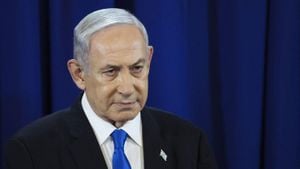A Chinese national was arrested recently for allegedly shipping illegal weapons, ammunition, and military equipment to North Korea, highlighting serious concerns about international arms trafficking and the defiance of U.S. sanctions. Shenghua Wen, 41, who resided illegally in Ontario, California, faces multiple charges, including conspiracy to violate the International Emergency Economic Powers Act. Federal prosecutors claim he was involved in exporting these restricted materials by concealing them within shipping containers departing from the Port of Long Beach.
According to statements from the U.S. Department of Justice (DOJ), Wen reportedly overstayed his student visa, rendering him unable to legally possess firearms or ammunition. Despite this, he allegedly collaborated with co-conspirators to orchestrate shipments to North Korea, which passed through Hong Kong before reaching their final destination. The shipments included approximately 50,000 rounds of 9mm ammunition, military identification devices, and technology meant to detect various threats, according to authorities.
This operation was not just opportunistic. Investigators revealed Wen’s links to North Korean government officials, who allegedly directed him to procure military supplies. During his time living illegally in the U.S., Wen purchased a federal firearms license under someone else's name, allowing him to source weapons without drawing suspicion. Reports suggest he may have received as much as $2 million from North Korean officials to finance these illegal endeavors.
Wen’s arrest was discussed by FBI Los Angeles Assistant Director Akil Davis, who emphasized the significant impact of preventing these items from reaching the North Korean regime. “The relevance of this arrest and the discovery of this scheme cannot be overstated,” he stated. “Not only did the investigative team prevent additional restricted items from being shipped to the North Korean regime, but they also collected invaluable intelligence for the U.S. and its allies.”
The investigations indicated Wen had sent at least two shipments of military equipment last year. An analysis of his communications suggested discussions about quantities and negotiations for the necessary materials. This led law enforcement to suspect he was preparing for activities potentially linked to hostile actions against South Korea.
Wen was reportedly cooperative during the interrogation process, admitting to his role and acknowledging the illegal nature of his actions. “He knew sending firearms and ammunition to North Korea was illegal,” the complaint stated, reflecting the gravity of his conduct.
Wen's home was searched, leading to the recovery of the ammunition as well as devices capable of identifying chemical threats and eavesdropping—tools considered indicators of serious intent. Another eyebrow-raising find was evidence demonstrating his efforts to purchase components, such as civilian aircraft parts, believed to be aimed at assisting North Korea's drone program.
The case extends beyond just Wen. With accusations of complicity stretching to unknown associates, authorities have expressed their intent to deepen the investigation. This not only covers the aspect of the arms shipped to one of the world’s most secretive and militaristic regimes but also touches on broader issues of illegal immigration and the national security risks posed by foreign nationals participating in black-market activities.
The arrest, which took place within the larger fight against international arms trafficking, has prompted discussions about border security and enforcing stricter penalties for foreign nationals involved in arms smuggling. U.S. Attorney for the Central District of California, Martin Estrada, remarked on the necessity of vigilance against foreign entities seeking to disrupt domestic and international peace.
Shenghua Wen now faces serious charges, which entail the potential of up to 20 years behind bars if convicted. His initial court appearance is slated for the immediate future, as both prosecutors and defense commence preparations for what is anticipated to be a complex case involving significant international ramifications.
Authorities remain steadfast about the overarching threat posed by arms trafficking, especially to adversarial regimes like North Korea. That’s why they are committed to not only prosecuting individuals like Wen but also dismantling the networks facilitating these illegal transactions. This case serves as a reminder of the lengths to which some will go to bypass the law and the increasing challenge of countering such operations on the global stage.
The actions taken against Wen reflect broader efforts across U.S. enforcement agencies to maintain integrity against illegal trafficking. Such operations often involve close collaboration with international partners and intelligence sharing to intercept illicit activities before they can escalate.
Wen’s case resonates within communities concerned about the repercussions of unregulated arms supplies falling inexplicably onto the black market and the potential danger this poses not just locally but internationally. With the North Korean regime infamous for its disregard for peace and aggressive military advancements, the successful interception of this smuggling scheme highlights the importance of cooperation between government entities.



